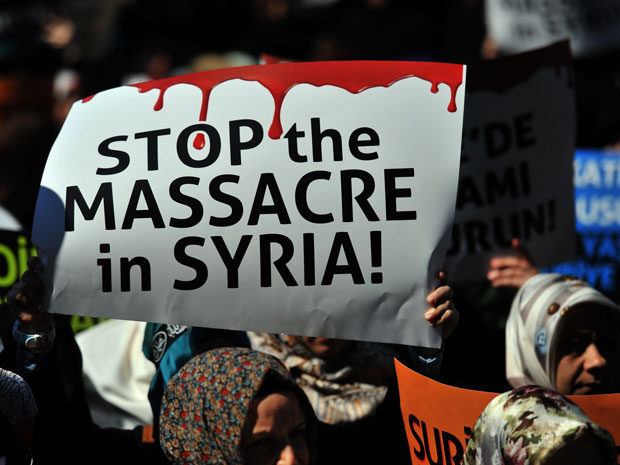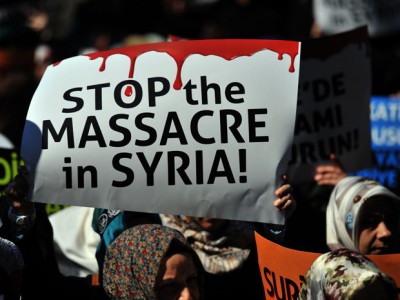Dr. Hayat Alvi for BeyondHeadlines
“’As we watched the efficient attack on Assad’s National Security council on Wednesday, Assad found himself one minister of defence and brother-in-law short. Interventions have been taking place in the 17 month old conflict since its inception, and the only issue now is for those who have picked their horse – in this case, the unpredictable, unknown creature called the Syrian opposition – to bide their time.
What we are watching now is the increasingly rapid entropy of the Assad regime and not without the considerable aid from several intelligence agencies which are many and varied – Jordanians, the Central Intelligence Agency, British, French and Turkish agents’.”
This is a quote from an online blog called “Above Top Secret,” which includes analysis from Stratfor Intelligence (a private open-source intelligence firm). I was also recently quoted for a Reuters piece on Syria speculating the same thing: that the sophisticated bombing successfully taking out key senior officials in Assad’s inner circle could not have happened without outside help, as well as an insider turncoat. It was indeed a spectacular attack that has shaken but not collapsed the regime.
The alleged outside support, which I am coining “Neo-Interventionism,” is not new or unique to the Middle East, especially in terms of supposed covert assistance being given to Syrian rebels. However, this neo-interventionism is unique in the sense that the outside supporters of the opposition see Syria as a means to undermine the Iranians. And, as much as some are profusely denying that a sectarian component exists in this scenario, it is clear as day that the backing of the opposition by conservative Sunni / Wahhabi Saudi Arabia, and Qatar, is imbued with the Sunni-Shiite rivalry and geopolitical, regional, and ideological competition. No one would be happier to poke the Iranian regime in the eye, and pull the rug out from underneath them, more than the Saudis and their allies, which includes Western powers.
Yet, many scholars, analysts, media, and regional and Western powers are conveniently turning a blind eye to this and a few other uncomfortable truths. Among these is the fact that the Saudis and Qataris are not involving themselves out of the goodness of their hearts. They see a golden opportunity here, but with gross disregard to the regional risks and perils that such neo-interventionism harbors. Part of my neo-interventionist theory is that old lessons from history are never learned, and the parties involved are bound to repeat history, like the civil war in Syria that is very similar to the civil war in Lebanon (or will ultimately morph into such). The only difference is that now there are some new actors involved in new contexts. The configurations and in some cases even the grudges remain unchanged.
Another uncomfortable truth is that atrocities and crimes are being committed by both the Asad regime and the opposition rebels. Robert Fisk of the Independent reports at least 200 women outside of Homes have been raped by both sides, and the actual numbers of victims could be much higher throughout Syria. Extra judicial killings and kidnappings are also taking place.
Yet another uncomfortable truth is that no one actually knows the composition of the rebels, and that among them are some unsavory characters, including hard-line Salafists, criminals, and drug addicts.
Quoting Robert Fisk again in his piece dated July 22, entitled “Sectarianism Bites into Syria’s Rebels,” he cites a young man who works for the Syrian opposition, upon his arrival to an office in Beirut. He bears a message for the opposition in Beirut just before the Damascus operation:
“His story was as revealing as it was frightening. Damascus was about to be attacked. But the fighters were out of control. There were drug addicts among them. ‘Some of our people are on drugs,’ the visitor said. ‘They will take anyone out. We can’t guarantee what some of these men will do. If they went into Malki [a mixed, middle-class area of central Damascus], we couldn’t protect any of the people who live there. We are against the Salafists who are fighting – there are good Syrians, Druze and Ishmaeilis [Alawites] who are with us. But if we capture Damascus, we don’t know how to run a small town, let alone a country’.”
If there is a lesson to learn from it’s the case of Libya, which is still a mess and where violence and kidnappings continue to plague society. But, Libya is nothing compared to Syria, especially with the potential for spillover of the civil war into Lebanon. If we think the case of Libya is turning into a transitional nightmare, then we must brace ourselves further for Syria’s civil war, as well as for the uncertainties pertaining to the post-Asad era. There is much speculation about what a post-Asad Syria would look like, but another uncomfortable truth is that the likelihood for power struggles, sectarian cleansing, ideological spats, and chaotic violence is very high.
There is no doubt that the Syrian civilians are suffering, including refugees fleeing to neighboring countries. They deserve security and protection, and a long-term solution for the future health of their country. In my opinion, the Asad regime and the rebels are disregarding the plight of the civilians caught in the middle of the conflict zones. And, the rest of the world is impotent, except for the neo-interventionism, which is myopically pursuing respective national interests, rather than genuinely concerned about the innocent non-combatants.
Says Robert Fisk:
“Now, of course, Saudi Arabia and Qatar, where al-Jazeera is based, make no secret of the funds and weapons they are running into Turkey and Lebanon for the resistance – without apparently caring very much who the ‘resisters’ are. The Lebanese army managed to stop one out of five shiploads of guns, but the others, carried on Sierra Leone-registered vessels, were able to unload.”
If either side – whether the Asad regime, the opposition groups, Free Syrian Army / rebels, and the foreign supporters – really cared about the Syrian civilian population, they all would stop what they are doing right now, lay down their arms, and sit at the negotiating table. Obviously, they each have their own agendas for Syria and possibly the region, and their actions show that the civilians are pawns and dispensable entities. Syria can end up becoming the Middle East’s Afghanistan.
Fisk’s last paragraph says:
“One of the two organizations that claimed responsibility for last week’s Damascus bombing, Liwa Islam – the Islam Brigade – raises again the Salafist element in Syria’s armed opposition. One newly arrived refugee from Syria told me last week that they have forbidden alcohol and openly say they intend to die fighting in Damascus. Given the savage response of the Syrian regime, they may get their last wish.”
It doesn’t seem to matter to them who gets in the way.
(Dr. Hayat Alvi is an Associate Professor at the US Naval War College, Newport, Rhode Island. She can be reached at hayat@hayatalvi.com. The views expressed here are personal.)























